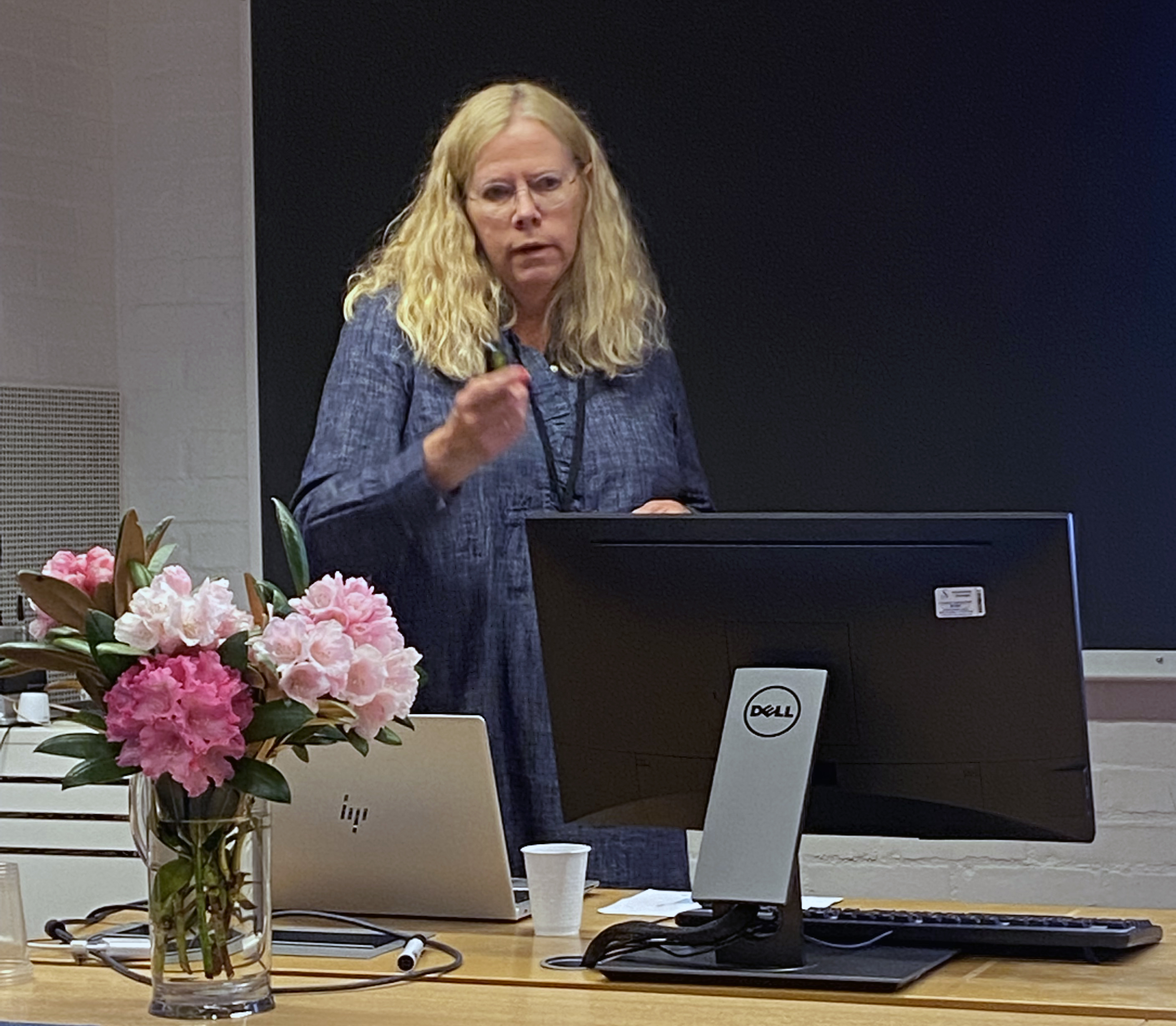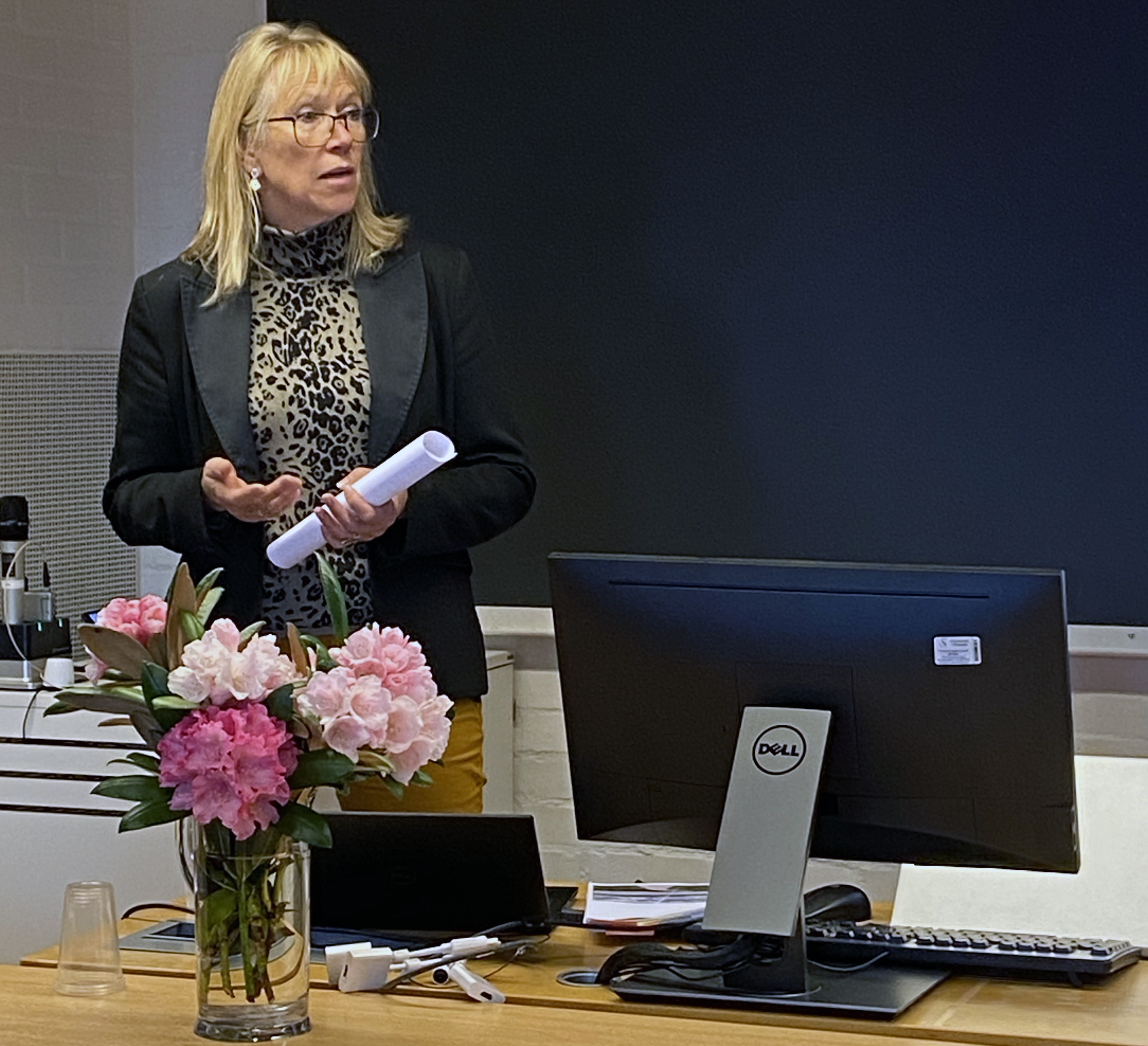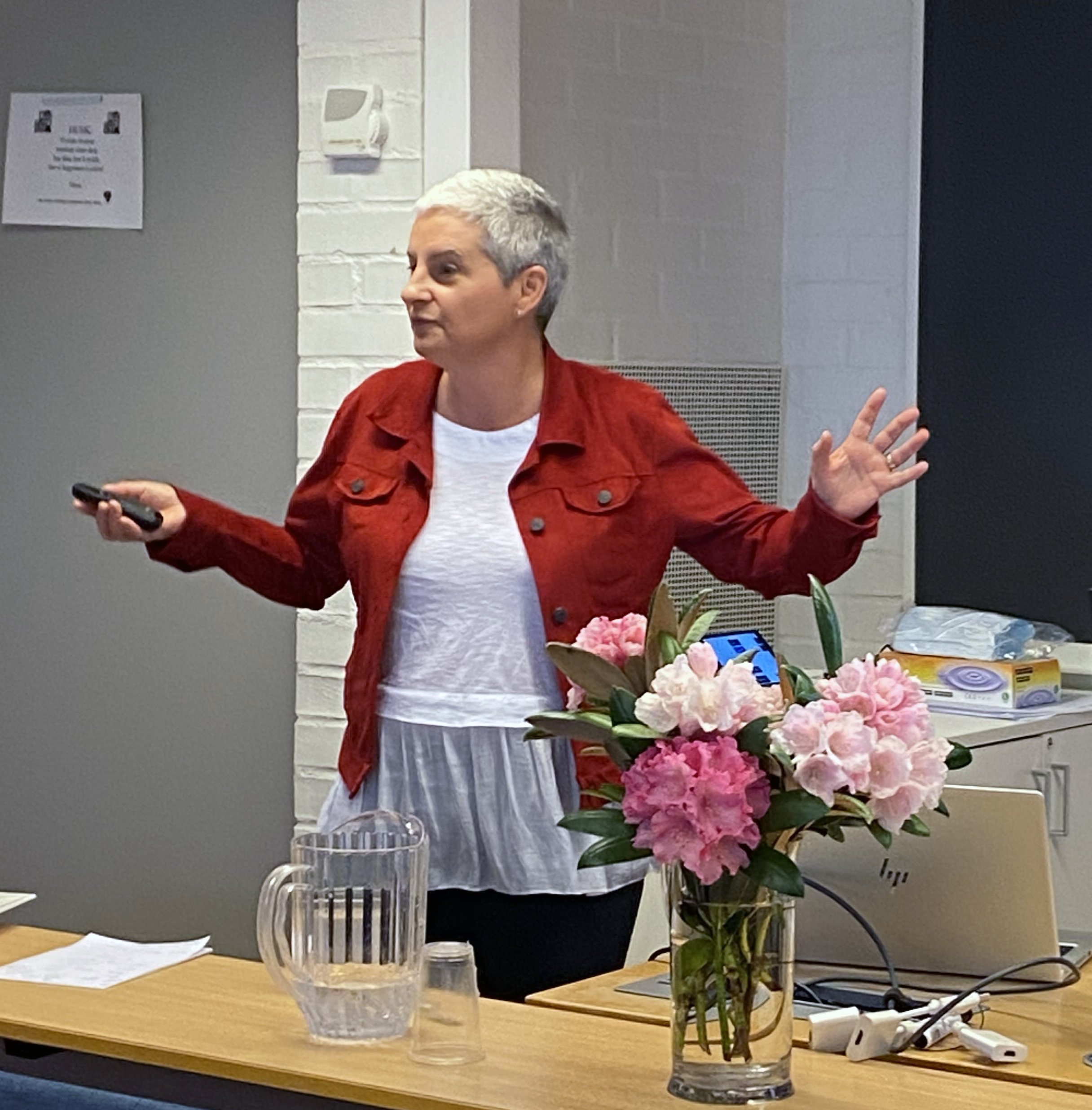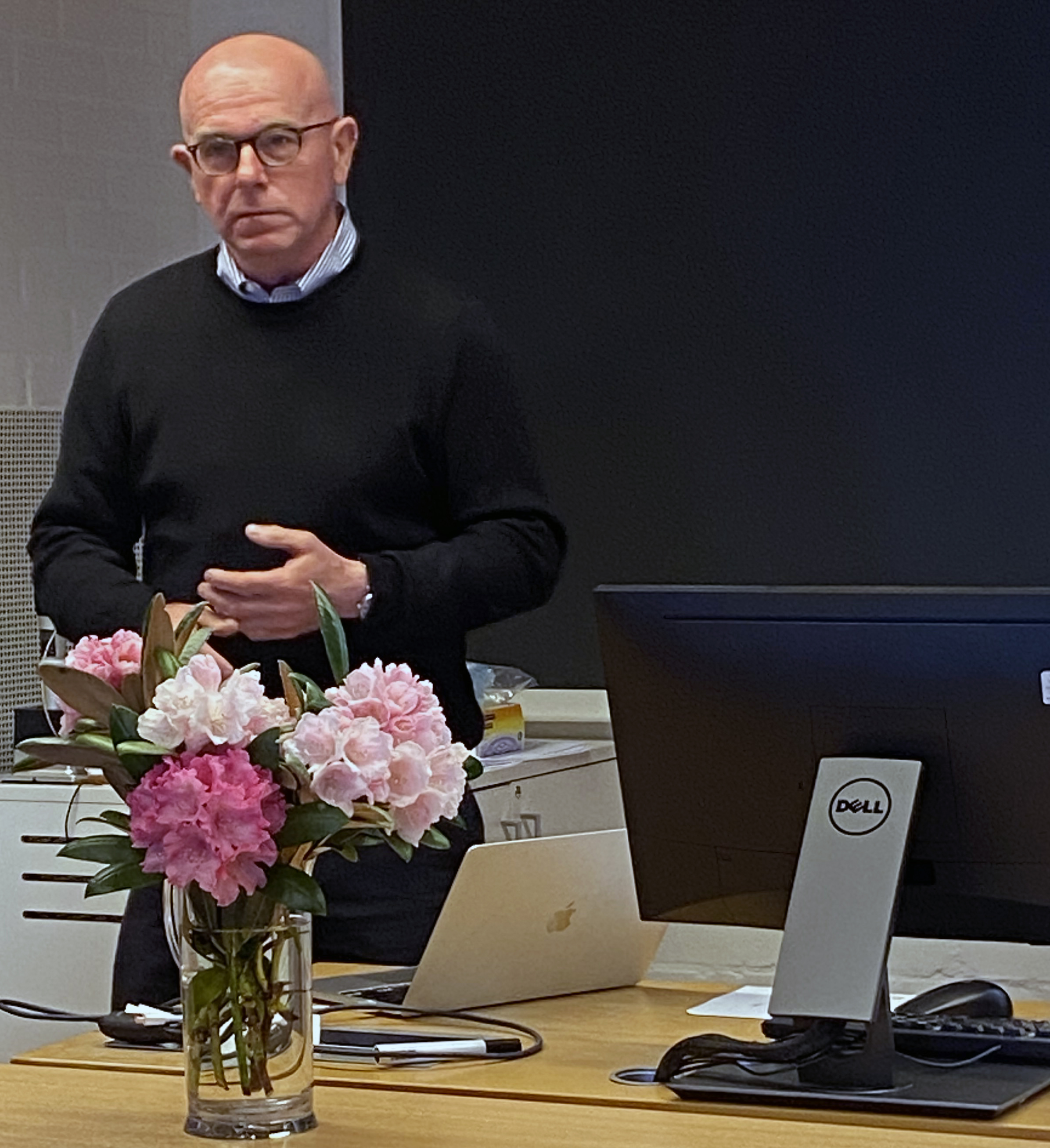The research project eHealth@hospital-2-home arranged a seminar at The Faculty of Health Sciences at UiS. It was held in English, and several international researchers traveled to Stavanger for the occasion.
The opening speech was held by Henriette Thune. She is the Dean of Research at the faculty and emphasized the importance of the topic and thanked everyone for participating at the seminar.
Afterwards, project manager Anne Marie Lunde Husebø presented the research project responsible for the seminar. The eHealth @ Hospital-2-Home project is a study on digital follow-up of patients with heart failure and patients surgically treated for colorectal cancer transitioning from hospital to home. The project period is from 2020-2024 and the project is funded by The Research Council of Norway.

The project objective is to develop a nurse assisted eHealth service that can reduce burden of treatment and costly hospital readmissions, and increase health-related quality of life (HRQoL) and collaboration with health care professionals in patients with Non-Communicable Disease (NCD), post-hospital discharge.
“The seminar was originally scheduled to take place in March but was postponed due to Covid restrictions. I'm glad we can finally meet physically”, states Husebø.
– Digital platform with several ways of communication
The study’s digital platform is Dignio Connected Care:
“The patients’ interface is MyDignio., which features several functions. Although we knew what digital platform to use, we were not sure as to which one of these functions the patients in our project would find relevant as a follow-up service. That is why we needed to do a bit of mapping in WP1 and also through evaluations in WP2 as to what the users think will work. There are also several ways of communication”, states Husebø.
PhD student Hege Wathne has been responsible for data collection and all the results from the patients so far. The first publication of the project (Morken et al. 2022) consists of 18 studies published between 2015-2018. It displays findings from literature review on eHealth and heart failure.
Husebø further emphasized that the project faced challenges in finding enough patients for work package 2. Omicron arrived at the same time as this was to start up in December. There are currently 14 patients in WP2: seven patients with heart failure at Stavanger University (SUH) Hospital, four patients with heart failure at St. Olavs Hospital and three patients surgically treated for colorectal cancer at SUH.
Digital home-based care: methods, findings, and dissemination. Evaluation of a National Welfare Technology Program
Siw Helene Myhrer is Senior Adviser at The Norwegian Directorate of Health.

The project is named "On the path from piloting to implementing Telehealth in Norway" - The national welfare technology program. The partners are The Norwegian Directorate of Health, the Norwegian Directorate for e-Health and the Norwegian Health Network. The program lasts until 2024.
She played a film that shows how patients' treatment is made easier by remote follow-up with digital aids, especially suitable for chronic diseases: «I used to call 911 a lot. Now I can handle this myself. I discover signs of deterioration and get supervision from a nurse when I need it.”, states a female patient in the film.
Overall, the evaluation indicates increased safety and improved Health with Telehealth. Three National advices on Telehealth:
- Municipal health and care services should facilitate and establish Telehealth.
- When you plan to establish Telehealth – cooperate within the health community.
- People with chronic conditions should be offered Telehealth as a tailored service.
Remote surveillance and Prostate Cancer
The project was presented by Alison Richardson, Professor of Cancer Nursing and End of Life Care. Executive Director: Southampton Academy of Research, Director: NIHR ARC Wessex, University of Southampton & University Hospital Southampton, UK.

The project aims to help men and their families get their lives back on track following diagnosis and treatment. It was established in 2015 and is funded by Movember in partnership with Prostate Cancer UK.
For men living with, and beyond, prostate cancer the impact of the disease on their everyday life is significant. As treatment for men with prostate cancer is completed, many men report a wide range of problems including fear of recurrence, fatigue, erectile dysfunction and urinary incontinence.
MyMedicalRecord is a cloud-based service, hosted in Microsoft Azure (UK data centre). It is a secure record that the patient owns and enables ongoing interaction between patient and clinical teams. The service is available 24/7 from any location or device with an internet connection. The software has a simple two-way integration to add patients and required hospital data and is built on a modern open platform enabling multiple apps and wearables to connect to the same data store.
Shared Decision Making
Glyn Elwyn, Professor. Coproduction Laboratory, The Dartmouth Institute for Health Policy & Clinical Practice, Dartmouth College, USA.
“We are in a moving world. It is moving very quickly”, states Elwyn. He discussed the communication between treater and patient with the attended people at UiS based on illustrations in the presentation.
According to him there are four key features of complexity in healthcare:
- Populations of agents + artefacts
- Interacting
- Dynamically
- With emergent rules and governance mechanisms, and bottom-up networks

“Technology links people in ways we didn’t know before”, states Elwyn, who further discussed the definition of shared decision making, which is central in health care. It is an approach where clinicians and patients make decisions together, using the best available evidence about the likely benefits and harms of each option, and where people are supported to arrive at informed preferences. Elwyn stated that the last part is the most important.
Technology will according to him help in the process of developing the communication in the health care sector in a modern way. Explained this by the functionality of several mobile applications.
Text and photo: Eigil Kloster Osmundsen
News from the Faculty of Health Sciences
Global State of Patient Safety 2023 – Supporting Leaders
At a time when healthcare is at a crossroads, the "Global State of Patient Safety 2023 – Supporting Leaders" seminar hos...
Oslo University Hospital is a new partner in SHARE
As a new partner, Section for Acute and Pre-hospital care at Oslo University Hospital strengthens research on prehospita...
Together for a Sustainable Future of Quality and Safety
SHARE - Center for Resilience in Healthcare recently hosted an international seminar titled “The future of quality and s...
Gathering International Researchers at Sola
SHARE – Center for Resilience in Healthcare at UiS is hosting Resilient Health Care Society’s summer conference at Sola ...
Organizes seminar on the future of quality and safety in healthcare
SHARE – Center for Resilience in Healthcare is hosting an international seminar titled “The future of quality and safety...
Prestigious EU grant for Health Services Research
Researchers at the University of Stavanger have received 6 million euros from the prestigious EU research program Horizo...
Ingvil Hellstrand Wins Award for Dissemination and Societal engagement
The UiS researcher moves elegantly between equal opportunities and gender diversity, welfare and caring sciences researc...
Signe Østrem Furre is the newest member of eHealth@H2H research team
She joins the existing team of nurses who have developed and are testing the nurse assisted digital application that aim...
Reducing nurses’ workload with exoskeletons
Students and researchers at UiS are convinced that exoskeletons can be a useful aid for operating room nurses during lon...
A Care Strategy for caregivers and care receivers by the EU
During the conference “From Knowledge to Action – the role of carers is changing?” in Oslo on March 16 Stecy Yghemonos h...
Simulating the future
The Faculty of Health Sciences at UiS organized the course “Simulation-based learning in nursing education” from April 1...
Patients and families engaged in resilient healthcare systems
Patients and their families contribute to the resilience of healthcare systems. This is particularly evident as global h...
Greater focus on the role of informal caregivers
Maja Hassel, next of kin and caregiver, thinks this year’s conference theme "Caregivers - from extra work to sound invol...
Two worlds colliding: exploring the boundaries between system resilience and individual resilience
A recent webinar organised by the Resilient Health Care Network focused on the intersection of individual psychological ...
New dean at the Faculty of Health Sciences
Eldar Søreide is the new dean at the Faculty of Health Sciences at the University of Stavanger from September 5th, 2022.
The Caring Futures project on TV2 News
Researchers from “Caring Futures: Developing Care Ethics for Technology-Mediated Care Practices” were interviewed and qu...
Divergent Approaches to the Future of the Health Sector
The Caring Futures research project invited five regional participants to a panel discussion at Sølvberget Library and C...
Bringing together stakeholders in care technology
In the end of September, Health Campus Stavanger, in collaboration with the Caring Futures research project invited rese...
Calls for more international research collaboration
Professor Stephen Billett from Griffith University Australia, is involved in several of SHARE – Centre for Resilience in...
Discussing the relationality between people and technology
This is a theme of interest to both the author Cathrine Knudsen and the artist Kari Telstad Sundet. The event, Science F...
A grand opening
After a long and close collaboration, Ingvil Hellstrand (UiS) and curator Hege Tapio were able to deliver their opening ...
Award winner visited the Faculty of Health Sciences
Rosalynn Austin from the University of Southampton visited the Department of Public Health to discuss health promotion f...
Gathers international researchers at the University of Stavanger
SHARE – Center for Resilience in Healthcare is hosting an international quality and safety in healthcare seminar at Ydal...
Successful funding application for 4-year project
The project will examine the mental health of indigenous and ethnic minority youth, in order to develop digital health s...
Positive feedback after digital workshop
The first digital workshop in the NORHED II project was successful, and developing simulation-based training is on sched...
A Norwegian project for student active simulation-based learning in higher education
Here we present a project that will substantially build on the findings of SAFETY+ and offers possibilities for future d...
Each emergency is different and requires different skills
Two medical emergencies have been outlined in this article. The SAFETY Project is about trying to understand different t...
Implementing simulation-based education in Malawi and Tanzania
The University of Stavanger has received NOK 18.7 million from Norad to implement simulation-based education in nur...
Training app for enhancing students' clinical nursing skills
Norwegian, English, and Spanish nursing students can now use a new app when practicing practical procedures. The app aim...
Cognitive and behavioral neuroscience lab
The Cognitive Lab provides the natural sciences and research on cognition and artificial intelligence with a meeting pla...






























